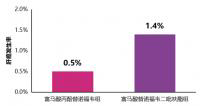PLoS One:胰岛素治疗增加国人肝癌风险
2013-01-30 10:58
阅读:2151
来源:medlive
责任编辑:PLoS One
[导读] 上海交通大学医学院附属上海市第六人民医院贾伟平教授等开展的一项队列研究提示,接受人胰岛素治疗的2型糖尿病患者罹患癌症的整体风险虽未额外增加,但肝癌风险明显升高,其全因死亡和癌症死亡风险也增加。
上海交通大学医学院附属上海市第六人民医院贾伟平教授等开展的一项队列研究提示,接受人胰岛素治疗的2型糖尿病患者罹患癌症的整体风险虽未额外增加,但肝癌风险明显升高,其全因死亡和癌症死亡风险也增加。
研究者从上海糖尿病登记研究中纳入8774例从未接受胰岛素治疗的糖尿病患者,分入胰岛素治疗组和非胰岛素治疗组,接受随访至首次确诊癌症或死亡或至2011年7月31日。结果显示,胰岛素治疗组和非胰岛素治疗组分别确诊98例和170例癌症,发生率分别为78.6/万病人年和74.3/万病人年,两组的癌症发生风险无显著差异(经校正RR=1.20,P=0.228)。与非胰岛素治疗组相比,胰岛素治疗组的肝癌风险显著升高(经校正RR=2.84,P=0.028),全因死亡(经校正RR=1.89,P<0.0001)和癌症死亡(经校正RR=2.16,P=0.001)风险亦升高。
研究者表示,尽管胰岛素治疗组糖尿病患者的全因死亡和癌症死亡风险均较高,但其病情相对严重,故应谨慎解读该研究结果。
上海交通大学医学院附属上海市第六人民医院贾伟平教授等开展的一项队列研究提示,接受人胰岛素治疗的2型糖尿病患者罹患癌症的整体风险虽未额外增加,但肝癌风险明显升高,其全因死亡和癌症死亡风险也增加。
研究者从上海糖尿病登记研究中纳入8774例从未接受胰岛素治疗的糖尿病患者,分入胰岛素治疗组和非胰岛素治疗组,接受随访至首次确诊癌症或死亡或至2011年7月31日。结果显示,胰岛素治疗组和非胰岛素治疗组分别确诊98例和170例癌症,发生率分别为78.6/万病人年和74.3/万病人年,两组的癌症发生风险无显著差异(经校正RR=1.20,P=0.228)。与非胰岛素治疗组相比,胰岛素治疗组的肝癌风险显著升高(经校正RR=2.84,P=0.028),全因死亡(经校正RR=1.89,P<0.0001)和癌症死亡(经校正RR=2.16,P=0.001)风险亦升高。
研究者表示,尽管胰岛素治疗组糖尿病患者的全因死亡和癌症死亡风险均较高,但其病情相对严重,故应谨慎解读该研究结果。
Cancer incidence and mortality in patients with type 2 diabetes treated with human insulin: a cohort study in shanghai
AIM:
The aim was to investigate the association between human insulin and cancer incidence and mortality in Chinese patients with type 2 diabetes.
METHODS:
We recruited 8,774 insulin-naive diabetes patients from the Shanghai Diabetes Registry (SDR). The follow-up rate was 85.4%. All subjects were divided into the insulin use cohort (n =3,639) and the non-insulin use cohort (n = 5,135). The primary outcome was the first diagnosis of any cancer. The secondary outcome was all-cause mortality. Cox proportional hazards model was used to estimate the relative risk (RR) of cancer and mortality.
RESULTS:
We observed 98 cancer events in the insulin use cohort and 170 in the non-insulin use cohort. Cancer incidence rates were 78.6 and 74.3 per 10,000 patients per year in the insulin users and the non-insulin users, respectively. No significant difference in cancer risk was observed between the two cohorts (adjusted RR=1.20, 95% CI 0.89-1.62, P=0.228). Regarding site-specific cancers, only the risk of liver cancer was significantly higher in the insulin users compared to that in the non-insulin users (adjusted RR = 2.84, 95% CI 1.12-7.17, P=0.028). The risks of overall mortality (adjusted RR = 1.89, 95% CI 1.47-2.43, P<0.0001) and death from cancer (adjusted RR = 2.16, 95% CI 1.39-3.35, P = 0.001) were all significantly higher in the insulin users than in the non-insulin users.
CONCLUSION:
There was no excess risk of overall cancer in patients with type 2 diabetes who were treated with human insulin. However, a significantly higher risk of liver cancer was found in these patients. Moreover, insulin users showed higher risks of overall and cancer mortality. Considering that individuals treated with insulin were more likely to be advanced diabetic patients, caution should be used in interpreting these results.
版权声明:
本站所注明来源为"爱爱医"的文章,版权归作者与本站共同所有,非经授权不得转载。
本站所有转载文章系出于传递更多信息之目的,且明确注明来源和作者,不希望被转载的媒体或个人可与我们
联系zlzs@120.net,我们将立即进行删除处理
本站所注明来源为"爱爱医"的文章,版权归作者与本站共同所有,非经授权不得转载。
本站所有转载文章系出于传递更多信息之目的,且明确注明来源和作者,不希望被转载的媒体或个人可与我们
联系zlzs@120.net,我们将立即进行删除处理
热点图文
-
AASLD2018研究进展丨慢乙肝患者治疗期间的肾脏安全管理
在新药取得成功之前,应用口服核苷(酸)类似物(NA)治疗慢性乙型肝炎(简称...[详细]
-
快讯丨TAF治疗4年的肝细胞癌发生率低于TDF
5月17日,在第十届全国疑难及重症肝病大会上,我国香港大学司徒伟基教授交流...[详细]


